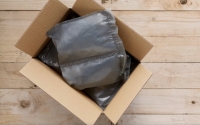Marketplace
- Domino Publishes Corporate Social Responsibility (CSR) Report Corporate Reports
- SCOPE from Ovarro supports Welsh Water response to severe storm Water
- First location in Nottinghamshire to install solar & wind powered defibrillator Health & safety
-
The Fentex Trapper Range
Spill Control & Clean Up

British-Made Innovation Powered by Recycled Materials
As sustainability becomes a defining priority for British industry, choosing products that are both high performing and responsibly made has never mattered more. At Fentex, environmental responsibility and British manufacturing go hand in hand. As the largest Spill Control manufacturer in Britain, Fentex delivers an unrivalled product range that is manufactured and packaged in the UK, supporting local industry while reducing environmental impact.
Resource & 'Waste'
A project in East England is set to transform a range of wastes, including difficult ones, into an energy source using a system run on solar power.
Ecover has unveiled two cleaning products, a multi-surface and a toilet cleaner, to showcase how the cleaning industry can use food waste to reduce its carbon emissions.
Tesco is set to make all its tea bags compostable via food caddies by the summer – more than one billion bags a year - ditching the plastic sealant within bags for a plant based alternative.
A new 'one million phones for the planet' programme has been launched by Vodaphone, and environmental group WWF, to eliminate e-waste and encourage a more circular economy for mobile phones by increasing the number of traded-in, refurbished and recycled devices.
Waste management specialist, Recycling Lives has found a green method which potentially could deal with every single part of the estimated two million cars which reach the end of their life in the UK every year, including the difficult leftover fraction.
The Ellen MacArthur Foundation (EMF) and the UN Environment Programme have released the New Plastics Global Commitment 2022 Progress Report, which found that companies will miss key 2025 targets for a circular economy for plastic. The report revealed that the target of achieving 100% reusable, recyclable, or compostable packaging by 2025 will 'almost certainly' not be met, and reported an overall increase of virgin plastic use back to 2018 levels.
14,400 nappies have avoided being sent to landfill and instead have been turned into useful materials such as road surfaces notice boards, panelling, insulation under laminate flooring and other insulation, as part of a trial that's the first of its kind in England conducted by Eco-friendly baby care company Pura.
Packaging made from daisies, hemp, straw, cocoa shells or seaweed could be landing on your doorstep in the future as DS Smith have announced that as part of their £100 million R&D programme, they'll be trialling using fibres from these sources to create the sustainable plastic-free packaging of the future.
Amazon will now no longer pack items with plastic air pillows for orders shipped from its fulfilment centres in the UK, replacing it with 100% recycled and recyclable packing paper.
Super bugs in sewage are helping to convert steelmaking emissions into sustainable raw materials for other industries, a new project led by the University of South Wales has discovered.



















